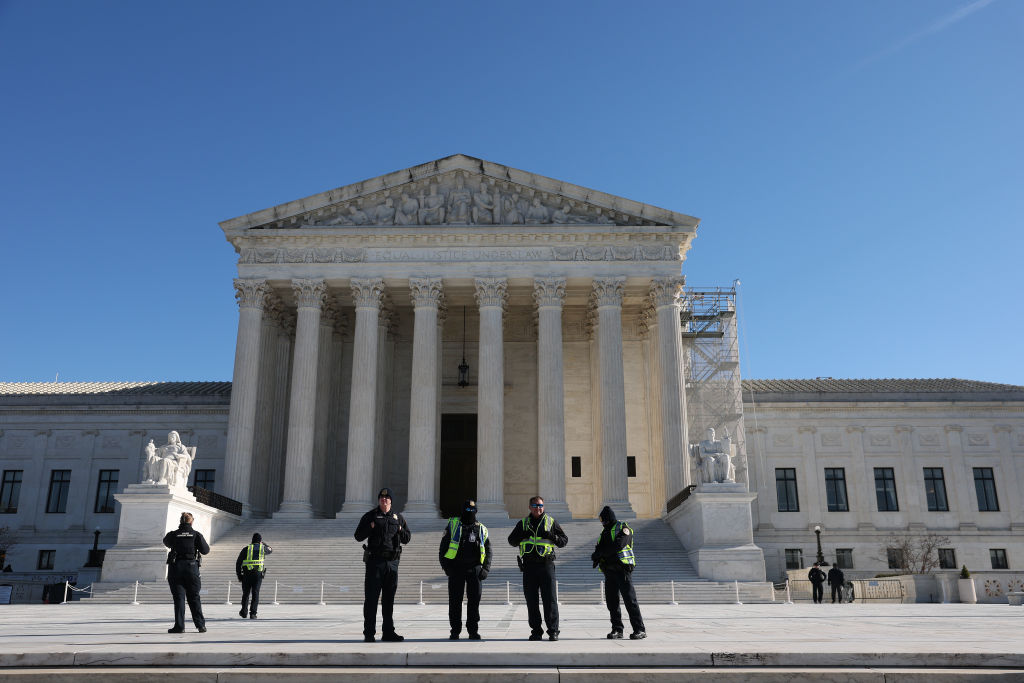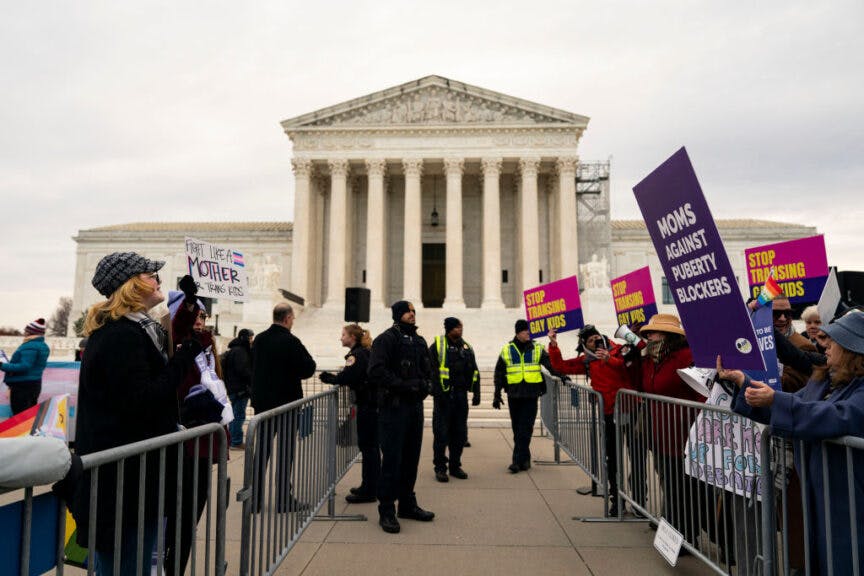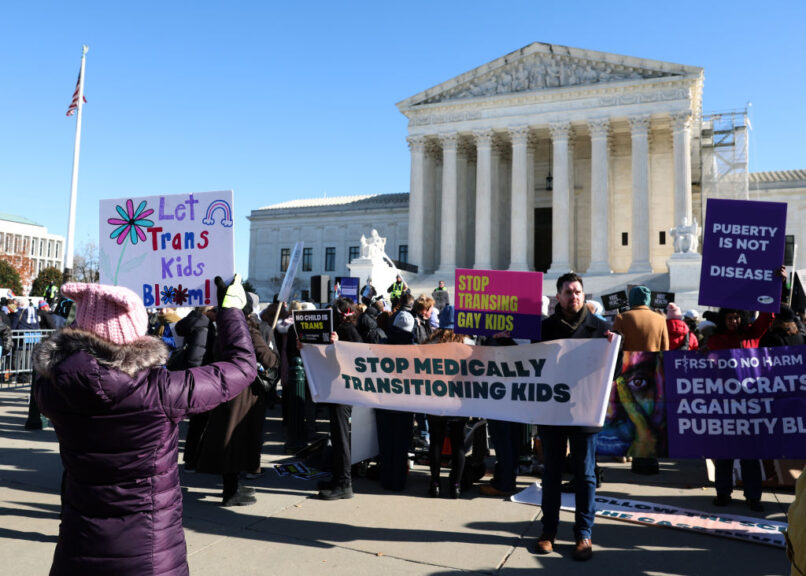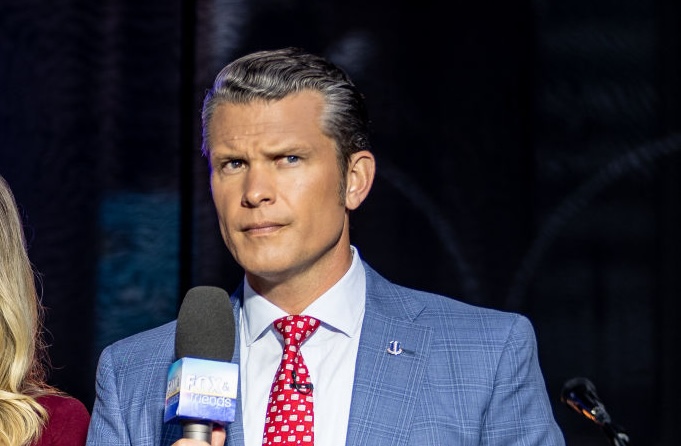‘$5 Billion Industry’: Breaking Down SCOTUS Oral Arguments On Transgender Case
The following is an edited transcript of an interview between Daily Wire Editor-in-Chief John Bickley and The Heritage Foundation’s Sarah Parshall Perry on a Sunday Extra edition of Morning Wire. The Supreme Court heard oral arguments Wednesday on what’s being called the marquee case of this term. In United States V. Skrmetti, three trans identifying ...

The following is an edited transcript of an interview between Daily Wire Editor-in-Chief John Bickley and The Heritage Foundation’s Sarah Parshall Perry on a Sunday Extra edition of Morning Wire.
The Supreme Court heard oral arguments Wednesday on what’s being called the marquee case of this term. In United States V. Skrmetti, three trans identifying teens, a Memphis physician and the Biden administration challenged a Tennessee state law that aims to protect children by banning puberty blockers and hormone therapy for the purpose of attempting to change a child’s gender.
* * *
JOHN: Joining us to break down this week’s oral arguments in United States V. Skrmetti and the broader implications is Sarah Parshall Perry, senior legal fellow at The Heritage Foundation. Sarah, thanks for coming on – always good to talk to you.
SARAH: Thank you for having me.
JOHN: So, this week we had the oral arguments for this landmark case. Now, we here at the Daily Wire have followed this case closely, in part because of the role Sunday Extra edition of Morning Wire. in this. His investigation into Vanderbilt helped prompt the law that this center’s on. First, can you walk us through how we got to the Supreme Court hearing?
SARAH: Yes. This actually came from a parental rights challenge. Three parents of transgender minors brought this challenge against SB1, which was a law that was enacted with bipartisan support in the state of Tennessee, saying that not only did it interfere with their rights to achieve this particular very controversial and experimental medical care for their children, but it was also a sex discriminatory law, and that would make it illegal, unconstitutional, under the Equal Protection Clause. Well, both the Federal Trial Court and the Sixth Circuit Court of Appeals found for Tennessee, basically determining that the state of Tennessee had satisfied the constitutional bar, and it had every interest in protecting minors from unproven sexism, scientifically sketchy procedures, and that this was well within their police power as the state. Well, by the time it got to the Sixth Circuit, the United States had filed a motion to intervene. It can do so when a state law challenging an equal protection clause violation is at issue. That’s what they did here. And so by the time it got to the Supreme Court, it only granted review of the United States’s claim and not the parental rights claim. So what we heard was oral arguments specifically dedicated to whether or not this was sex discrimination under the Equal Protection Clause.
JOHN: So, let’s unpack that a bit more. What is the argument for this being sex discrimination and the argument against it?
SARAH: Well, Elizabeth Prelogar, the U.S. Solicitor General for the United States, argues for the Biden administration that because the law makes a distinction on boys who are identified as boys at birth who want to get testosterone, but will not allow girls who are identified as boys who want as male at birth – being transgender, of course – they cannot get access to testosterone, that that’s a facially discriminatory characteristic. But what the law actually does, and the state legislators were very careful to engage in this type of analysis, is to simply restrict for both males and females any access to the drugs determined by their age alone – which the Supreme Court has never held to be a class requiring elevated scrutiny — and also based on the use to which the drugs would be put. So restricted only based on use and age, nothing more, and treated men and women equally under the law.
JOHN: And to be clear, what is barred here is to use these controversial procedures, these hormone treatments, these puberty blockers, in order to attempt to change the gender or sex of a minor, correct?
SARAH: That’s exactly it. In fact, there is no restriction on the use of these puberty blockers for endocrine disorders like precocious puberty, which obviously indicates that those are appropriate medical uses. And of course, the state of Tennessee restricts the use of other drugs for particular purposes as well. It wants to make sure that the dangers of “off-label use” — And that’s exactly what’s involved here. This is off-label use of unproven drugs for gender dysphoria. They want to make sure that that use is restricted, and they’re constitutionally permitted to do that.
JOHN: For those who aren’t familiar with that term, “off-label” – which is actually crucial in this case – what does that mean in this context?
SARAH: The FDA, the Food and Drug Administration, has never approved puberty blockers for “gender dysphoria.” It has never approved those particular drugs for which these minor children and their parents, and the United States, have all argued to get access to. Instead, it’s only approved them for endocrine disorders. So the state of Tennessee does not want minor children assuming the risk of off-label use and making determinations that could have lifetime consequences.
JOHN: Now, judging from what we heard on Wednesday, where do you think the justices are leaning in this case?
SARAH: I think there’s a very strong reason to believe that at least five of the justices are going to be skeptical of the United States’ arguments. In fact, Justice Alito himself was fairly excoriating in his refusal to allow Elizabeth Preloger, the Solicitor General, to be creative with her legal analysis and to ignore the science. In fact, he said that she’s relegated to a footnote in the bombshell Cass Review Report, which came out of England earlier this year, but in fact the science itself is we also know that Justice Kavanaugh said there is “a red light” here to prevent us from getting involved in new areas and constitutionalizing new areas of medicine. Justice Barrett said this is a question better left for the legislature, as did the Chief Justice himself, who actually quoted, without citing the case, Dobbs v. Jackson Women’s Health by saying this issue is better suited for the people and their elected representatives. Strangely silent was Justice Gorsuch, who had nothing to say during two and a half hours, and he may be the swing vote in this.

Credit: Photographer: Al Drago/Bloomberg via Getty Images.
JOHN: Justice Gorsuch was notably silent. Do you have any sense of why that might have been the case?
SARAH: You know, it could be one of two things. First of all, I think it’s wise to remember that Justice Gorsuch was the majority opinion author in Bostock versus Clayton County dating to the year 2020. And in that case, Title VII of the Civil Rights Act, relative to employment discrimination, was expanded not only to prohibit sex discrimination, but also to prohibit anti-racism and gender identity discrimination. Now, he was that opinion’s majority author. He may have been dealing with the fact that there is now a recognition that the Bostock opinion was a Pandora’s box. The Biden administration has used the Bostock opinion to expand the administrative state, and to force gender identity into concepts like medicine, school lunches, education, and more. That is something I think with which he will have to ultimately reckon because Elizabeth Preloger, the Solicitor General, mentioned the similarity to Bostock, so he very much may have been curling his toes underneath the table.
JOHN: So will this ruling potentially override that – will this set a new precedent in terms of that discrimination clause writ large?
SARAH: Well, as the other justices noted, particularly conservative justices, the analysis for a constitutional claim, a violation, for example, of the Equal Protection Clause and whether it discriminates based on sex, is slightly different than a discriminatory analysis based on sex under civil rights law. The Constitution holds to a higher bar, what’s called intermediate or heightened scrutiny, and that’s a higher bar for a state to achieve. But that analysis is different enough where Bostock is different from the current issue. I do think what it will do, however, is pin back the ears a little bit, the reach of the Bostock determination, and ensure that equal protection claims are not brought alongside statutory civil rights discrimination claims.
JOHN: All right so that was the conservative response – what did we hear from the Left-leaning justices?
SARAH: Unsurprisingly, there was a lot of histrionic commentary about trans kids dying and that these are proven scientific interventions, when in fact we know that is not the case. But the most interesting comparison came from Justice Kanji Brown Jackson, who cited Loving v. Virginia as a analogous case law study, and in Loving v. Virginia, that was the case in which the Supreme Court invalidated the interracial marriage ban from that state under the Equal Protection Clause, essentially overriding the judgment of the state legislature. She argued for the United States to be able to do so here, but ignored the fact that, once again, sex is not the defining characteristic at issue.
JOHN: Right – and Brown’s questions in particular gained a lot of negative attention online. Now, it’s notable that the conservatives seem to suggest that this issue is more appropriate to be dealt with by state legislatures rather than the court. And I think the implication there is that science is constantly being updated and reexamined, the best practices are often changing. Is the idea here that a federal court ruling can be too permanent in a sense for medical practices?
SARAH: Well, I’ll harken back to the Dobbs decision again, and we know the line of viability, for example, that Roe v. Wade set shifted and changed over the fifty years before Dobbs versus Jackson women’s health. And in writing the majority opinion, Justice Alito mentioned the fact that they should not be constitutionalizing areas of medical regulation. That was wholly within the state’s authority. I think they are very likely here to make the exact same determination, especially with so recent a ruling like that on the books.

Credit: Photo by Kevin Dietsch/Getty Images.
JOHN: When do we expect a decision to be handed down on this case?
SARAH: Well, there are quite a number of high-profile decisions, but I would argue this is the most high-profile, which indicates to me we are not likely to see an outcome here until probably the end of June 2025.
JOHN: Okay, so beyond the Supreme Court and constitutional issues here, looking at the broader legal issues here – one of the things that the Matt Walsh investigation uncovered was an apparent financial incentive for promoting the kind of very controversial, permanent treatments that we’re seeing with these transgender minor operations procedures. Do you foresee legal trouble for those that have been involved in these kinds of programs?
SARAH: That’s a good question. We know that this is a three to $5 billion a year industry and some estimates are as high as $10 billion. On average, gender medicine yields a doctor $8,000 per single procedure in sole profit. So we know money had to be spent, quite a bit to do with this and with the incentive of doctors to medicalize these minor children, but there is good news. We’ve already seen a lawsuit coming out of California brought by Harmeet Dhillon’s law firm and she’s done excellent work. They are suing Kaiser Permanente for rushing three minor girls, three young teen girls, through the gender medicine gambit without getting informed consent. I do believe a reckoning is coming.
JOHN: You mention Harmeet Dhillon, we actually caught up with her recently and she gave as an overview of her cases involving transition procedures. Here’s some of what she said:
HARMEET: We literally filed the first, second, and third lawsuits on this issue in the country. I think other lawyers are joining us and so these cases are winding their way through the court system or through arbitration, because Kaiser tries to force people into arbitration, so do other medical providers. And one of the issues why there’s so few cases is because there’s statute of limitations that are very short that really keep the window very narrow for these young women — largely women — to file lawsuits. And so it’s heartbreaking the number of people we simply can’t help because of these statute of limitations issues. I do think that’s going to make a difference, but the bigger and faster and more effective long term difference is going to be legislatures banning these procedures on children. Medical boards taking away the licenses of doctors who commit medical malpractice, which I believe most of these doctors are doing. I mean, you literally have cases where people go in, some guidance counselor sends them for one session with some rubber stamper who then goes and gets the girl’s breasts cut off. It’s shocking and outrageous, it’s insane and it needs to stop. And we shouldn’t rely on the courts and lawyers. We should ask Republican legislatures and Democrat legislatures, frankly, if they care about humans, to stop this practice.
JOHN: Final question: How significant will this ruling ultimately be? Is it fair to say that this ruling will change how the issue of laws about trans procedures in the other states are handled by the courts?
SARAH: Yeah, I think that’s exactly accurate. In fact, there are other cases relative to the notion of gender identity pending on the Supreme Court’s docket. But I think the first shot across the bow is the particular notion of gender medicine, because that is at bottom such a controversial notion. I do believe for the 26 other states who are watching keenly what happens with Tennessee’s ban, when they themselves have almost identical bans within their own states. They are very hopeful that the Supreme Court will come down on the side of states rights and their ability to protect minor children, which is something that the Supreme Court has recognized for more than a hundred years.
JOHN: A consequential decision coming this summer. Sarah, thanks so much for coming on. That was Heritage Foundation senior legal fellow Sarah Parshall Perry and this has been a Sunday Extra edition of Morning Wire.
***
CHECK OUT THE DAILY WIRE HOLIDAY GIFT GUIDE
Originally Published at Daily Wire, World Net Daily, or The Blaze
What's Your Reaction?

































































































